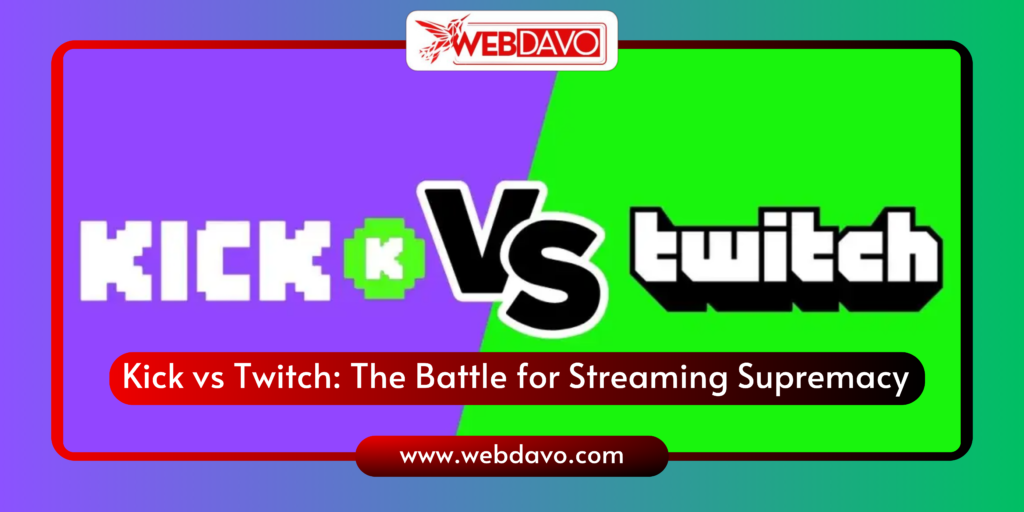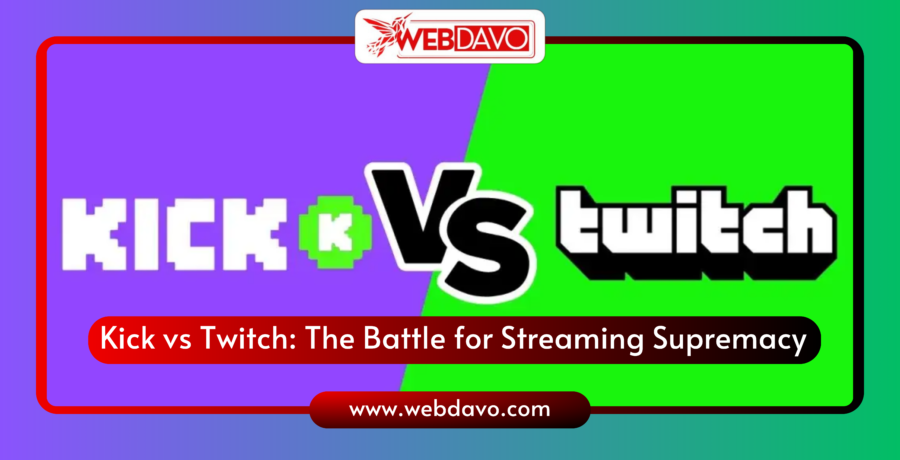Streaming Supremacy: Kick vs. Twitch
In the ever-evolving world of online entertainment, livestreaming platforms have become a dominant force, connecting millions of viewers with content creators worldwide. Two of the most prominent players in this arena are Twitch and Kick, platforms that have captured the attention of streamers and viewers alike. While Twitch has long held the reins as the undisputed king of livestreaming, Kick has emerged as a formidable challenger, poised to disrupt the status quo.

Inside Kick upstart Streaming Competitor Twitch
In a world dominated by Twitch, a new challenger has emerged: Inside Kick. This upstart streaming platform has attracted attention with its aggressive approach to luring creators away from Twitch, offering them eyebrow-raising multimillion-dollar contracts and a significantly higher revenue share (5% compared to Twitch’s 50%).
Here’s what we know about Inside Kick:
Ambitious Growth Strategy:
- Kick has been funded by the online casino Stake, which has also heavily promoted the platform.
- They’ve signed high-profile streamers like xQc and Amouranth with lucrative contracts, making headlines in the gaming world.
- Kick boasts a sleek and user-friendly interface, with features that rival Twitch’s own offerings.
Creator-Friendly Approach:
- Kick’s low revenue share is a major draw for creators, who can potentially keep a larger portion of their earnings.
- The platform also offers flexible tools and features to help creators build their communities and grow their audiences.
- Additionally, Kick has a strong focus on supporting marginalized communities and fostering a more inclusive environment.
Challenges and Concerns:
- Some criticize Kick’s close ties to Stake, raising concerns about potential conflicts of interest and the promotion of gambling.
- The platform’s long-term viability remains uncertain, given its reliance on significant financial backing.
- The potential for fragmented audiences across multiple platforms could be detrimental to the streaming ecosystem as a whole.
Will Inside Kick dethrone Twitch?
It’s still too early to say for sure. While Kick is making waves in the streaming world, it faces a significant uphill battle against Twitch’s established dominance. Only time will tell if Kick can truly shake up the industry and become a legitimate competitor.
Also read: Current progress of Artificial Intelligence
Twitch: The Established Giant
Twitch, acquired by Amazon in 2014, is the undisputed heavyweight of the streaming world. With over 14 million active daily users, it boasts an impressive collection of established streamers, including household names like Ninja, Pokimane, and xQc. The platform’s success lies in its focus on gaming content, catering to the vast audience of gamers who flock to Twitch to watch their favorite players compete and share their passion for games.
Kick: The Rebellious Challenger
Kick, a relative newcomer to the scene, has emerged as a formidable challenger to Twitch’s dominance. Founded in 2022, Kick has quickly gained traction, attracting over 21 million accounts in a short period. Its appeal stems from its more relaxed content policies and generous revenue splits, offering streamers a larger share of their earnings compared to Twitch’s model. This has enticed many popular streamers to switch platforms, further boosting Kick’s visibility.
- Kick was founded in 2021 by Bijan Tehrani and Ed Craven, the co-founders of Stake.com.
- The platform has over 21 million accounts and is growing rapidly.
- Kick is available on a variety of devices, including computers, smartphones, tablets, and smart TVs.
What Does This Mean for Twitch?
The rise of Kick has put a lot of pressure on Twitch to change. The platform has already made some changes in response to Kick, such as increasing its revenue-sharing model to a 55/45 split. However, it remains to be seen whether Twitch will be able to maintain its dominance in the streaming market.
Is Kick the Future of Livestreaming?
It is too early to say whether Kick will be able to dethrone Twitch as the king of livestreaming. However, the platform has already made a significant impact on the industry, and it is likely to continue to grow in the years to come.
Here are some of the reasons why Kick has been so successful:
- It has tapped into a growing desire for more freedom and flexibility among streamers.
- It has offered a more generous revenue-sharing model than other platforms.
- It has attracted a number of popular streamers from Twitch.
Kick is still a relatively new platform, but it has already made a significant impact on the livestreaming industry. The platform’s relaxed content policies and lucrative revenue-sharing model have attracted a number of popular streamers, and it is possible that Kick could eventually challenge Twitch for dominance in the livestreaming market.
A Clash of Philosophies
The rivalry between Twitch and Kick extends beyond their respective user bases and content offerings. It represents a clash of philosophies, with Twitch embodying the established, corporate approach and Kick embodying the rebellious, challenger spirit. Twitch’s focus on moderation and adherence to community guidelines has attracted some users and streamers alike, while Kick’s laissez-faire approach has appealed to those seeking more freedom of expression.
Strengths and Weaknesses:
Kick’s Strengths:
- Relaxed content policies attract a diverse range of streamers and viewers
- Generous revenue sharing incentivizes content creators
- Rapid growth indicates strong user interest
Kick’s Weaknesses:
- Lax content moderation raises concerns about harmful content
- Smaller user base compared to Twitch
- Relatively new platform with limited brand recognition
Twitch’s Strengths:
- Established presence and vast user base
- Stricter content moderation promotes inclusivity
- Diverse monetization options for streamers
Twitch’s Weaknesses:
- Revenue sharing model criticized by some streamers
- Increasing competition from Kick and other platforms
- Potential for stagnation due to its established nature
The Battleground: Key Differentiators
The rivalry between Twitch and Kick centers on several key differentiators:
- Content Policies: Twitch maintains stricter content moderation guidelines, often resulting in bans for streamers who violate its community standards. Kick, on the other hand, adopts a more laissez-faire approach, allowing for a wider range of content, including controversial and explicit material.
- Revenue Split: Twitch offers a standard 50/50 revenue split for streamers, while Kick boasts a more streamer-friendly split of 70/30, keeping 70% of the revenue generated from their streams. This financial incentive has been a major draw for streamers considering a switch to Kick.
- Community Focus: Twitch emphasizes a vast and diverse community, catering to a broad range of interests and demographics. Kick, in contrast, cultivates a more intimate and niche community, appealing to a specific audience seeking a more personal and engaging experience.
Impact on the Livestreaming Industry
Kick is still a relatively new platform, but it has already made a significant impact on the livestreaming industry. The platform’s relaxed content policies and favorable revenue split have attracted a number of popular streamers, and it is possible that Kick could eventually challenge Twitch for dominance in the livestreaming market.
Other Upstart Streaming Platforms
In addition to Kick, there are a number of other upstart streaming platforms that are trying to challenge Twitch, including Trovo, Caffeine, and Facebook Gaming. However, Kick is currently one of the most popular and well-funded of these platforms, and it is well-positioned to continue to grow in the years to come.
The Future of Livestreaming
The battle between Twitch and Kick is far from over. Both platforms continue to evolve, adapt, and innovate, vying for the attention of streamers and viewers alike. Twitch’s established dominance and vast user base provide a strong foundation, while Kick’s fresh approach and streamer-centric policies offer a compelling alternative. Ultimately, the future of livestreaming will depend on how these platforms navigate the ever-changing landscape, catering to the evolving demands of content creators and viewers.
While both Twitch and Kick have their strengths and weaknesses, their rivalry has undoubtedly benefited the livestreaming industry as a whole, driving innovation and providing more options for streamers and viewers. As these platforms continue to grow and adapt, they have the potential to further revolutionize the way we consume and engage with online entertainment.
Conclusion: A Tale of Two Titans
Overall, Inside Kick is an exciting development in the streaming world. Its focus on creator support and innovation could potentially lead to a more competitive and diverse landscape for all involved. Only time will tell if Kick has what it takes to become a true force to be reckoned with in the streaming wars.



